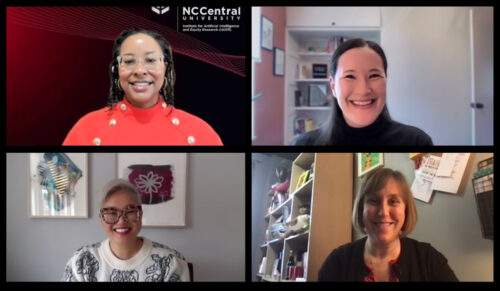As the go-to encyclopedia, Wikipedia’s content should reflect the diversity of the real world, but in areas like gender representation, it still falls short.
The gender gap on Wikipedia extends across subjects and biographies to its contributors themselves – a gap that individuals, organized groups of editors, and organizations like Wiki Education are tackling head on.
In celebration of Women’s History Month, I had the pleasure of bringing together four scholars from across the country to explore the ongoing efforts to close the gender gap on Wikipedia. As part of Wiki Education’s monthly Speaker Series, the event “Persistence & Progress: Confronting Wikipedia’s gender imbalance” sparked meaningful dialogue between the panelists and our global audience.
Despite the ongoing and concentrated efforts of individuals and organizations alike, why do these gaps continue? One key reason is the precarity of labor as it relates to who contributes to Wikipedia, explained panelist Kira Wisniewski, Executive Director of Art + Feminism.
“It’s truly incredible that Wikipedia is the effort of millions of volunteers, but who actually has the ability to volunteer?” asked Wisniewski. “[For example], there have been many studies about how women, and particularly women of color, have been disproportionately affected by COVID. When you think of the factors of who is even able to volunteer, it helps reveal more answers on how these gaps appear and persist.”

Information activism and the work to support new editors is more important now than ever, emphasized Wisniewski: “What do people edit about? They edit about things they know…so that’s why working with students and getting people editing is so important.”
And there’s no doubt that professors like panelist Caroline Smith and her students are making significant progress in filling these gaps. Through their Wikipedia assignments, Smith’s students have collectively contributed 100,000 words to Wikipedia – and their work has been viewed more than 8 million times!
From the first time Smith incorporated the assignment into her Communicating Feminism course at The George Washington University, she noted how the coursework on Wikipedia resonated with her class. When her students looked for gender gaps in the online encyclopedia, they were surprised by just how much was missing – and that surprise created a sense of urgency to improve it, Smith observed.
“[They] found it so interesting and rewarding, and I think it spoke to some of the historical issues we were discussing throughout the semester in a really real, tangible way,” said Smith, who shows her students Wikipedia articles about their own institution to highlight gender gaps. “They were shocked to find that the amount of space devoted to the [Women’s Leadership] program is much less than some of the other things that happen on George Washington’s campus. Students see that and realize, even in this space I’m occupying right now, we’re seeing these imbalances.”
Like Smith, panelist Siobahn Day Grady also teaches with Wikipedia with free support from Wiki Education, empowering her students to add notable women and other historically excluded figures to the encyclopedia. Initially unsure about bringing a Wikipedia assignment into her course, Grady ultimately found the experience rewarding, just like her students.
“There are so many times when people don’t even recognize that they are worthy to have a Wikipedia article, that their contributions matter,” said Grady, a professor at North Carolina Central University. “I really take these moments as pure joy to celebrate the achievements of women doing amazing things that may not have an opportunity to have their work shared, if not through this work that we do with Wiki Education.”
Panelist Whitney James enrolled in a Wiki Education editing course in summer 2024 to learn how to contribute to Wikipedia herself, then incorporated Wikipedia assignments into her first-year writing courses.
But the University of Notre Dame professor didn’t stop there – she joined two more of our editing courses to improve Wikipedia’s coverage of women herself. As a new editor, James worked to improve existing content and created new Wikipedia articles for notable women including investor Tracy Gray and corporate sustainability expert Esther An.
“I feel like this work has a low barrier for entry and a really high impact,” said James. “It’s also very rewarding for me personally, which is an important self-care thing to think about. This is a really important space right now, and I’m happy to be part of it.”
As we wrapped up the discussion, I asked the panelists if they had advice for anyone who found our conversation interesting and liked the idea of a more inclusive Wikipedia, but didn’t feel like their individual efforts could make a difference on closing the gender gap. Smith kicked us off with a simple answer and a laugh.
“I would just say, no, that’s wrong,” said Smith. “Every voice matters and can make a difference. Maybe that’s oversimplifying, but I feel like it takes a lot of little movements to create broader change.”
Catch up on our Speaker Series on our YouTube channel and join us for our next webinar on Tuesday, April 22!
En “abling” Change: How Wiki Education is tackling disability on Wikipedia
Tuesday, April 22, 2025
11 am Pacific / 2 pm Eastern
REGISTER NOW
Interested in incorporating a Wikipedia assignment into your course? Visit teach.wikiedu.org to learn more about the free resources, digital tools, and staff support that Wiki Education offers to postsecondary instructors in the United States and Canada.
Visit learn.wikiedu.org to explore our editing courses for subject matter experts.
Connect with Art + Feminism at artandfeminism.org.
